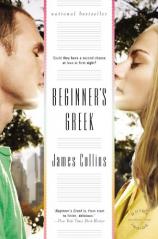Reading Group Guide
Discussion Questions
Beginner's Greek

1. At the beginning of the novel, Peter Russell is convinced that he will meet and fall in love with a beautiful young woman aboard a plane, and then Holly sits down next to him. Later, Peter reflects that it must have been fate. Do you agree that Holly and Peter were fated to be together?
2. Peter sees Holly reading Thomas Mann’s novel The Magic Mountain, and the two of them bond over the book. Why do you think James Collins chose this particular novel as the catalyst for Peter and Holly’s relationship? If you were sitting next to a stranger on a plane, what book in the stranger’s hand might have a comparable effect on you?
3. Early in the novel Peter reflects that happiness in a committed relationship is “the result of grueling, arduous, unrelenting effort” (page 19). How do his opinions evolve? Do you find Peter’s attitudes about love and happiness to be true to life?
4. When Peter marries Charlotte, he “could not think of a single reason not to have married her” (page 100). How does this union compare with others in the book? If Jonathan had survived, could Peter and Charlotte have been happy together?
5. If Peter’s best friend, Jonathan, hadn’t met and charmed Holly, it seems unlikely that she and Peter would ever have reconnected. What do you think of Jonathan’s role in the story --- and his sudden demise?
6. Jonathan’s young female fans are eager to know how it is that he writes so well from a woman’s point of view. Parts of Beginner’s Greek are written from the perspective of various female characters. Do you think these passages are rendered as successfully as the passages told from Peter’s perspective? Name some other works of fiction that you think manage to capture particularly well the perspectives of both men and women.
7. At different points in the novel Julia and Charlotte both reflect on beauty, and particularly on what beauty means for women. What role does beauty play in Beginner’s Greek? Discuss how beauty relates to art --- in life and in literature.
8. Soon after her divorce proceedings begin, Julia realizes that she’s in a unique position to help Charlotte live out her dream, though Julia would do so at great personal risk because of her ruthless, soon-to-be-former husband. Why do you think Julia takes this risk?
9. Peter and Holly are both said to be “good” in some essential way. What constitutes this goodness? When in the novel does a sense of moral obligation conflict with the pursuit of happiness?
10. An underlying theme of the novel is the power of money. At the dinner at Arthur Beeche’s extravagant mansion, Peter sits next to Lisa Eisler, a hero in humanitarian work. Eisler says, “I figure that somebody should lead the life Arthur does” (page 318). What do you think of this statement? Do you agree with her?
11. Among other conversational tours de force at the Beeche dinner is Peter’s recital from memory of a poem called “Beginner’s Greek” by James Merrill. Why do you think James Collins chose this as the title of the novel? How would you interpret Merrill’s line, “What is / Beyond analysis / Is perilous”?
12. When Peter is asked for his definition of love, he says, “When two people are in love, they are parallel lines. That intersect” (page 324). Do you agree?
13. Like many Victorian novels, Beginner’s Greek ends with a marriage. Could this book be said to be a Victorian novel of sorts? How so --- or why not?
14. If you had to write an epilogue to the novel, how would you envision these characters’ lives five years down the road?
Beginner's Greek
- Publication Date: May 13, 2009
- Paperback: 441 pages
- Publisher: Back Bay Books
- ISBN-10: 0316021563
- ISBN-13: 9780316021562







